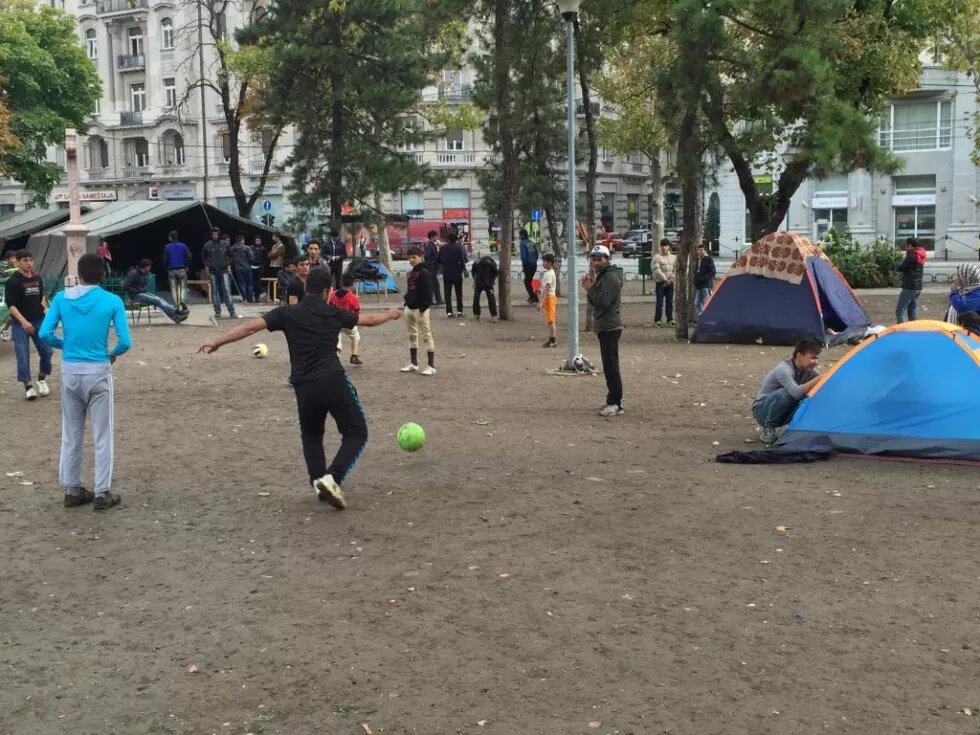
As European and Western Balkan leaders met in Vienna at the EU-Western Balkans Summit on 26 and 27 August 2015 Serbian Prime Minister Aleksandar Vučić praised Serbia’s treatment of refugees in contrast to some EU member states, especially Hungary and Greece, when it comes to registration, and to barbed wire fence and tear gas.
A closer look will not completely confirm this Serbian official voice, but the statement shows that the refugee crisis dominated most of the official discussions at the Vienna summit and it also highlights the absurdity of the Western Balkans being outside the EU: Tens of thousands of refugees are crossing an EU and Schengen country (Greece) to escape through two non-EU countries (Macedonia and Serbia) to get to another Schengen/EU country (Hungary). The latter one's government – a member of the allegedly pro-European European People's Party – was building a 175 km long fence along the Serbia-Hungary border which erects yet another barrier to refugees seeking protection.
Unnecessary to say that this summit was unable to offer more than symbolic support to the countries where thousands of refugees are stranded in legal limbo across the Balkans – or as Amnesty International (ai) is warning: Serbia and Macedonia have become a sink for the overflow of refugees and migrants that nobody in the EU seems willing to receive. And there is a real concern that refugees are getting trapped in a 'Balkan no-man’s land' without protection or support, whilst EU countries turn their backs.
The „Western Balkans route“ has become the busiest irregular passage to Europe overtaking the Mediterranean route which remains the most deadly, a recent ai-report said. And increasingly Macedonia and Serbia are unable to cope with the rising number of refugees. In August Macedonia declared state of emergency, sealing its Southern border for two days with paramilitary police and military forces to prevent refugees entering the country. According to UNHCR the Serbian authorities are now able and willing to deal responsibly with this challenge. But also in Serbia reception conditions remain inadequate, and access to asylum is extremely difficult. It is true, however, that Serbia has not been using tear gas against refugees as some authorities have done in Greece, neither building a barbed wire fence or wall as the Hungarian government is doing.
The majority of people using this route are mainly from Syria, Afghanistan, Iraq, Eritrea and Somalia. They mostly come via Greece, and with the recent surge in sea arrivals there, the number of people undertaking this journey is expected to grow. Some are registering for asylum in the Balkans while others head onwards, but both groups face mounting danger.
The increase in arrivals doesn’t absolve countries along the Balkan route of their legal obligations. The authorities in the Western Balkan countries must still live up to their international obligations towards asylum-seekers, including allowing those seeking asylum to do so in a prompt and effective manner. But individuals who attempt to seek asylum in Serbia or Macedonia face severe obstacles. In 2014, only 10 asylum seekers were granted refugee status in Macedonia and only one was granted asylum in Serbia. Discouraged by the slow progress in processing asylum applications, most asylum seekers continue their journey into Hungary, where they face further - and for an EU country - completely unacceptable severe violations of their rights.
The ever-growing number of migrants and refugees taking the Balkan route is a consequence of a broader failure of EU migration and asylum policy on which Serbia and Macedonia have no control. Placing the primary responsibility for processing asylum applications on the first EU country of entry (with the Dublin regulation) and limiting safe and legal avenues of entry has put an unsustainable strain on the EU’s outer fringes and neighbouring states. Therefore I agree completely with the Amnesty International-resumee: „Serbia and Macedonia have to do much more to respect migrants and refugees’ rights. But it is impossible to separate the human rights violations there from the broader pressures of the flow of migrants and refugees into and through the EU, and a failed EU migration system."